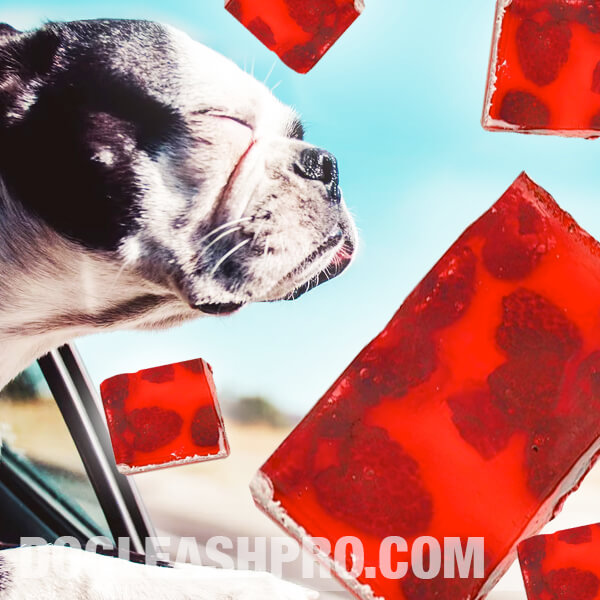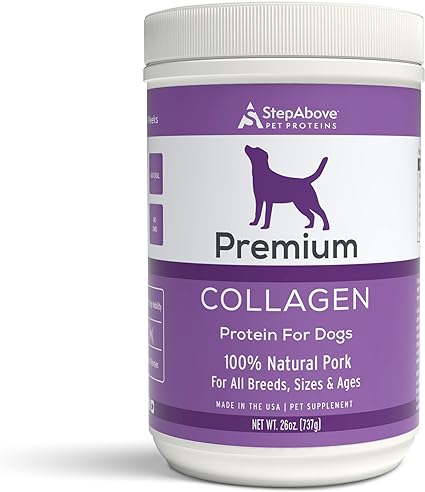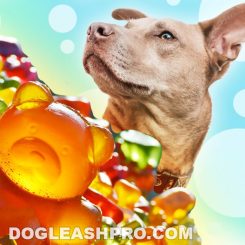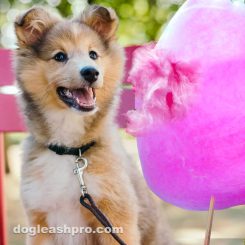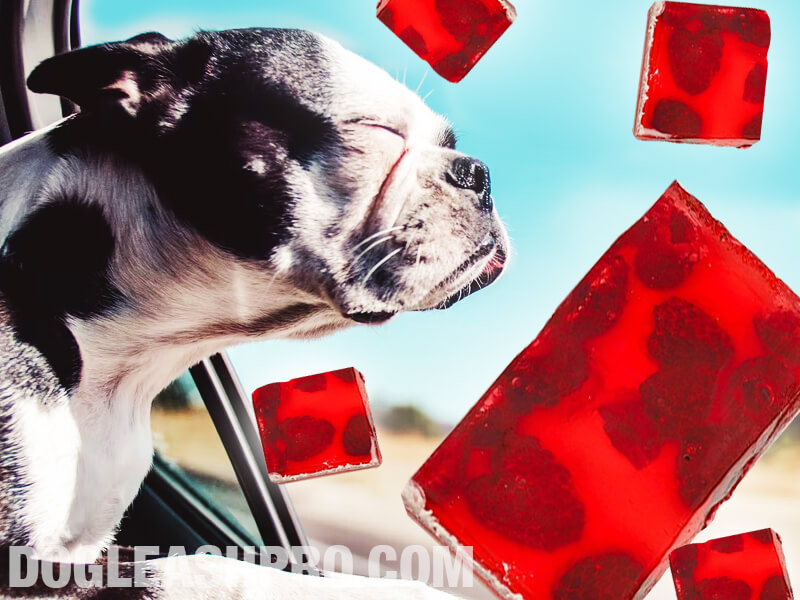
Can dogs eat Jello? Yes, dogs can eat Jello in small amounts as a rare occasional treat as long as it doesn’t contain artificial sweeteners like xylitol. Fortunately, most Jello varieties are not toxic to dogs, but moderation is key since consuming too much can lead to health issues.
Jello may seem safe for doggy consumption, but are there ingredients in Jello that can be harmful to dogs? In this article, we’ll go over different types of Jello and whether they are safe for dogs to eat. In the meantime, here’s the brief answer if you’re wondering, “can dog eat Jello?”
Table of Contents
Can Dogs Have Jello?
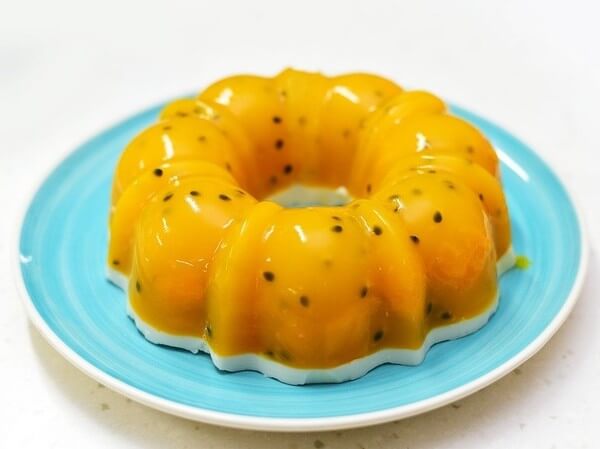
Dogs can have Jello in small portions and as a rare treat. However, ideally, dogs should not have Jello.
While most Jellos generally do not contain any ingredients that are toxic to dogs, they are not healthy for your canine friends’ health.
Instead of giving your dog Jello, give them the Step Above Proteins Premium Gelatin Protein for Dogs.
However, if you already gave your pooch a tiny bit of Jello, your dog should be fine.
To find out why dogs should not have Jello, let’s quickly go over what Jello is.
What is Jello?
You can find Jello at your local grocery store. They can be in powder form inside a packet or in ready-to-eat form.
Jello comes in a variety of different bright colors such as red, yellow, orange, green, blue, and many more! Jello also comes in a variety of flavors as well.
When you buy Jello in powdered form, it’s important to note that the Jello powder contains both powdered gelatin and powdered flavorings.
This includes sugar or could even include artificial sweeteners depending on which Jello you prefer to buy.
For instance, the sugar-free Jello powder form may contain artificial sweeteners like xylitol which is dangerous to dogs.
Many will pour hot water over the Jello powder and let it cool down. Once cool, you’ll see the bright color Jello and it’s ready to eat.
Many love Jello because it’s a fun snack where they can add whipped cream, vegetables, and fruit to make it more interesting and enjoyable to eat.
Before we delve into whether dogs can eat gelatin, let’s understand the typical ingredients found in Jello and their potential implications for our furry friends.
Ingredients Typically Found in Jello and Their Potential Health Risks for Dogs:
- Gelatin: Gelatin itself, especially unflavored and plain varieties, is generally safe for dogs. It’s derived from animal skin, connective tissues, or bones and can be beneficial for a dog’s skin, joints, and overall health. However, the source of the gelatin matters; for instance, beef or fish gelatin is safe, but always ensure it’s unflavored.
- Sugar: While a small amount of sugar won’t harm dogs immediately, excessive sugar can lead to health issues such as obesity, diabetes, and cardiovascular diseases.
- Artificial Sweeteners: These are unhealthy for dogs. Among them, xylitol is especially dangerous. Xylitol is toxic to dogs and can cause brain damage and other severe health issues. It’s imperative never to give dogs anything containing xylitol.
- Artificial Flavors: These do not offer any health benefits to dogs and can be harmful if consumed regularly.
- Artificial Colors: Flavored Jellos often contain artificial colors, which are not recommended for dogs.
- Preservatives: While not explicitly mentioned in the sources, preservatives are commonly found in store-bought food products. They can have adverse effects on dogs if consumed in large quantities.
Thus, while certain ingredients in Jello can be safe for dogs in moderation, it’s essential to be aware of the potential risks associated with others, especially artificial sweeteners like xylitol.
Always consult with a veterinarian before introducing any new food to your pet’s diet.
Can Dogs Eat Gelatin?
Yes, dogs can eat Gelatin because it is safe for doggy consumption. In fact, plain and unflavored gelatin is actually good for your dog’s joints, bones, and skin.
If you’re feeding your pooch Gelatin, make sure it’s plain without any added flavorings, added sugar, or contain artificial sweeteners.
You can add some canine-friendly treats, fruits, or vegetable to gelatin and make it a nutritional and fun treat.
But remember that moderation is key. So only offer a small amount.
According to a study published on PubMed Central (PMC), here’s what they said:
“Gelatin given by vein to doubly depleted dogs (anemic and hypoproteinemic) gives no immediate toxic response, no anaphylactoid reactions, and may contribute something to the building of new hemoglobin and plasma protein. However, gelatin given by vein for extended periods can cause serious disturbances. Some experiments with gelatin by vein for short durations, when combined with amino acids or casein digests, show potential benefits, suggesting possible usefulness of gelatin with amino acids or casein digests in acute emergencies.”
This highlights the potential benefits and also the need for caution when considering gelatin as a supplement for dogs.
How Much Gelatin To Give A Dog?
Plain and unflavored gelatin from animals is safe and healthy for your dog. It helps their skin, fur, joints, and bones. You can add it to their homemade meals or store-bought wet doggy food.
How much you give depends on your dog’s weight.
Here’s a guide if you feed your dog gelatin twice a day:
- 75-100+ pounds: 1 tablespoon
- 50-75 pounds: 2 teaspoons
- 25-50 pounds: 1 teaspoon
- 10-25 pounds: 1/2 teaspoon
The Step Above Proteins Premium Gelatin Protein for Dogs is for K9s of all ages and it’s a great supplemental collagen in your dog’s diet.
Visual Guide on Gelatin Dosage for Dogs
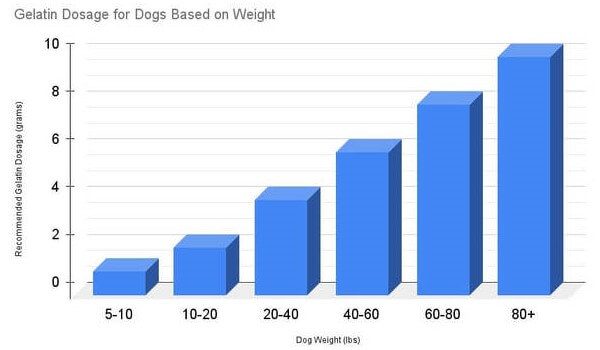
Note: This chart is a general guideline. Always consult with a veterinarian before introducing any new supplement to your dog’s diet.
Is Jello Bad For Dogs?
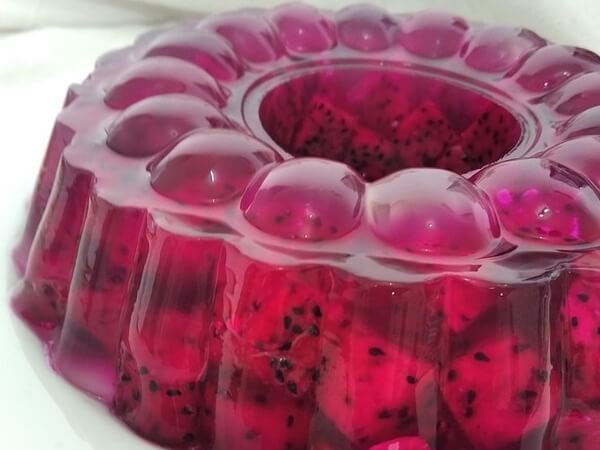
Jello is bad for dogs if it has added sugar and contains artificial sweeteners like xylitol. We highly recommend that you do not feed your four-legged friends any food or snack with xylitol in it as it can cause xylitol poisoning in dogs.
Signs of xylitol poisoning in dogs include:
- A sudden drop in the dog’s blood sugar.
- Lethargy.
- Vomiting.
- Diarrhea.
- Body weakness.
- Unable to walk properly.
If you can or have time, it’s best to make homemade Jello treats for dogs. This will ensure that the Jello contains unflavored or plain gelatin without any added sugar or artificial sweeteners.
According to the The College of Veterinary Medicine at Michigan State University, their research pointed out that:
“The sugar substitute xylitol is not toxic to humans, but when ingested by dogs, can cause a sudden release of insulin, which may cause seizures and result in brain damage. Liver failure is another potential result…Koenigshof and her co-authors examined records of 192 dogs known or suspected to have eaten products containing xylitol. Of the 192 cases, 122 dogs (+63%) were hospitalized for supportive care and 30 dogs (+15%) became hypoglycemic at some point during evaluation at a veterinary teaching hospital.”
This emphasizes the severe risks associated with xylitol ingestion in dogs and the importance of keeping products containing this ingredient away from them.
You might be interested in: My Dog Is Acting Drunk And Wobbly – Should I Be Concerned?
Is Jello Good For Dogs?
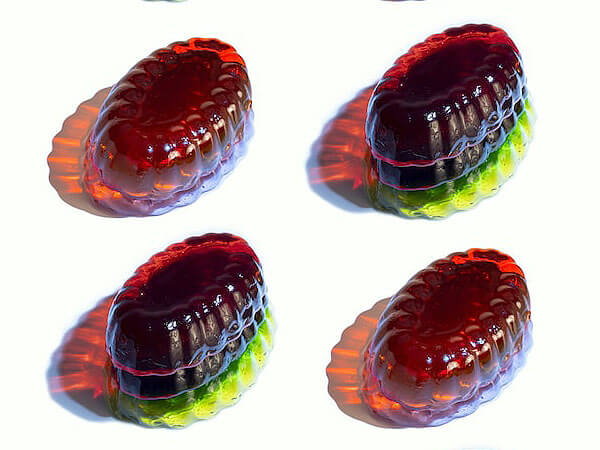
Jello is not good for dogs. Many store-bought Jellos contain sugar or artificial sweetener, artificial flavors, and food coloring. All of this is dangerous for your dog’s health.
Artificial sweeteners like xylitol in Jello can cause xylitol poisoning in dogs.
Too much sugar consumption is bad for dogs. This can lead to weight gain, canine obesity, dental issues, metabolic changes, diabetes, and even pancreatitis.
Artificial flavors are not good for dogs because they don’t provide your dogs with any nutrients or health benefits.
And lastly, food coloring contains dye can cause dogs to become sick.
Does Jello Have Xylitol?
Some Jello may have xylitol. If you go with sugar-free Jello, they may contain artificial sweeteners like xylitol.
Before you offer your pooch a small amount of Jello, check the ingredients first and make sure none of the ingredients are toxic to your canine friends.
Dogs And Jello
Can Dogs Eat Sugar Free Jello?
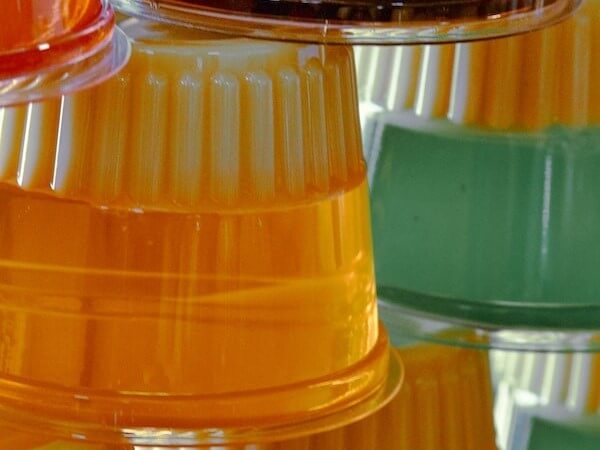
No, dogs should not eat sugar free Jello. Does sugar free Jello have xylitol? Sugar free Jello usually contains artificial sweeteners like xylitol which is not only unhealthy for your furry friends but also harmful and toxic to them as well.
So, can dogs have sugar free Jello? No, dogs should not have sugar free Jello. Avoid feeding your pooch sugar free Jello and always check the ingredients first. If it contains xylitol as an artificial sweetener, do not give sugar free Jello to your furry family member.
Is sugar free Jello bad for dogs?
As we can see, sugar free Jello is bad for dogs because it may contain artificial sweeteners such as xylitol.
Can Dogs Eat Flavored Jello?
No, dogs should not eat flavored Jello.
While the gelatin itself isn’t harmful, flavored Jello often contains artificial sweeteners, colors, and flavors that can harm dogs.
Specifically, some Jellos contain xylitol, a sweetener that’s toxic to dogs.
While flavors like strawberry, lime, and cherry are popular among humans, they’re inappropriate for canine consumption.
Always prioritize your dog’s health by giving them safe and dog-friendly treats.
Can Dogs Eat Strawberry Jello?
No, dogs should not eat strawberry Jello. Can dogs have strawberry Jello? No, dogs should not have strawberry Jello because this flavored Jello contains high amounts of sugar, artificial colors, and artificial flavors that are all unhealthy for doggy consumption.
You might also like: Can Dogs Eat Strawberry Jam?
Can Dogs Eat Orange Jello?
No, dogs should not eat orange Jello. Similar to strawberry Jello, it contains an artificial orange flavor which is not good for your dog’s health. Also, it is also high in sugar and contains artificial colors.
Can dogs eat Jello shots?
No, dogs should not eat Jello shots. That’s because Jello shots may contain alcohol and it’s not wise for dogs to consume any food that has alcohol in it.
If your pooch accidentally ate some of your homemade Jello shots, find out how much of them your pooch ate and write it down.
You’ll also want to call your vet immediately and bring your pooch in for a check-up or examination.
Can Dogs Eat Jello With Fruit?
Dogs should be cautious when eating Jello with fruit.
While plain gelatin isn’t harmful, Jello often contains sugars and artificial additives unsuitable for dogs.
Additionally, certain fruits like grapes are toxic to dogs.
It might be less concerning if the Jello contains safe fruits like blueberries or apples without seeds (moderation is key), but it’s best to avoid giving Jello altogether to ensure your dog’s safety and well-being.
Can Dogs Eat Jello Pudding?
Dogs should avoid Jello pudding. While the main ingredients might not be immediately harmful, Jello pudding contains sugars, artificial flavors, and potential additives unsuitable for dogs.
Consistent consumption can lead to digestive issues, diabetes, and obesity.
It’s best to offer your dog treats formulated explicitly for them to ensure their health and safety.
Gelatin And Dogs
Gelatin is a beneficial supplement for dogs, especially those with joint issues or conditions like a torn ACL.
Derived from animal collagen, it offers essential nutrients that support the healing and maintenance of joint health and benefit the skin and overall well-being.
As dogs age, their natural collagen production decreases, leading to potential joint issues and a decline in skin and coat condition.
Supplementing with gelatin can provide preventive advantages, aiding in the recovery of conditions like hip dysplasia and supporting their health throughout various life stages.
Best Gelatin For Dogs
One of the top choices for dog owners is the Step Above Proteins Premium Gelatin Protein for Dogs.
This product boasts a singular premium ingredient, offering multiple benefits like aiding aching hips and joints, fostering lean muscle growth, managing allergies, and ensuring a lustrous coat.
Collagen, a primary component of this product, constitutes about one-third of your dog’s protein.
As our dogs age, their collagen production wanes. But with this supplement, you can combat the effects of aging, from arthritis to skin quality deterioration.
Suitable for dogs of all ages, this collagen formulation boosts muscle growth, alleviates joint pain, and fortifies the immune system.
Furthermore, its unique taste ensures dogs love it, making supplementation a breeze – simply sprinkle it over their meal.
A noticeable improvement in your dog’s health and demeanor will be evident within weeks.
Trusted by vets and loved by dogs, Step Above Proteins is 100% natural, grain-free, and non-GMO. It’s the perfect addition to your dog’s diet.
Can Dogs Eat Beef Gelatin?
Yes, dogs can safely eat beef gelatin. It’s beneficial for their joints, skin, and fur.
However, it shouldn’t be given regularly but as a treat, making up about 10% of their total calorie intake.
Always choose plain and unflavored gelatin. Consult your vet for any specific concerns.
Can Dogs Eat Gelatin Capsules?
Yes, dogs can ingest Gelatin capsules, as they’re typically made of digestible material.
Gelatin capsules contain protein from animal bones and skins, making it safe for doggy consumption.
Therefore, medication for dogs that comes in Gelatin capsules are usually safe for your K9 friends.
However, if you’re not sure what the contents inside the capsule are and whether they’re safe for your dog, please consult your vet for guidance.
Can Dogs Eat Fish Gelatin Powder?
Yes, dogs can eat fish gelatin powder. It’s a safe and nutritious treat when given in moderation and as a homemade dog treat.
Always ensure it’s plain and unflavored. If unsure, consult your vet before introducing it to your dog’s diet.
Can Dogs Eat Great Lakes Gelatin?
Yes, dogs can eat Great Lakes Gelatin if it’s the plain, unflavored variety. It can be beneficial for their joints and overall health because it’s made from beef collagen.
However, always introduce new supplements in moderation and consult your vet to ensure it’s appropriate for your specific pet.
Can Dogs Eat Knox Gelatin?
Yes, dogs can safely eat Knox Gelatin if it’s the plain, unflavored type. This is another popular gelatin brand that is absolutely safe for K9 consumption.
It’s good for their skin and joints and overall well-being.
However, always give it in moderation and check with your vet before adding it to their diet.
Can Dogs Eat Plain Gelatin?
Yes, dogs can safely eat plain Gelatin. Plain Gelatin is the safest kind of Gelatin, making it the perfect treat to give to your dog.
It’s beneficial for their joints and health.
You can also sprinkle it over your dog’s wet food or stir it into their warm homemade dishes. Be sure to give in moderation.
If you’re not sure how much to give your pup, always consult your vet for specific guidance.
Can Dogs Eat Gelatin Sweets?
While dogs can ingest Gelatin itself, many Gelatin sweets contain added sugars, artificial flavors, and sometimes xylitol, a sweetener that’s toxic to dogs.
It’s best to avoid giving Gelatin sweets to dogs.
Instead, opt for plain Gelatin like the Step Above Proteins Premium Gelatin Protein for Dogs or dog-specific treats to ensure their safety and well-being.
My Dog Ate Jello – What should I do?
If your dog ate Jello, don’t panic. You’ll want to find out what type of Jello it is (whether it is sugar-free or not) and the ingredients in this Jello.
In the event that the Jello contains xylitol as one of its ingredients, contact your vet right away.
Your canine friends will most likely be fine if the Jello doesn’t contain any ingredients that are toxic to dogs. Observe them carefully after they’ve consumed the Jello and watch for any negative reactions.
You’ll want to provide them with a bowl of water so they can stay hydrated after they’ve consumed the Jello.
So, can dogs eat Jello?
While most Jello is safe for doggy consumption, it isn’t the healthiest for dogs. For the reasons above, it’s best to keep Jello away from dogs and stick to healthy dog treats that contain nutrients instead of just sugar and artificial flavors and colors.
DISCLAIMER: THIS WEBSITE DOES NOT PROVIDE MEDICAL ADVICE
The information, including but not limited to, text, graphics, images and other material contained on this website are for informational purposes only. No material on this site is intended to be a substitute for professional veterinary advice, diagnosis, or treatment. Always seek the advice of your veterinarian or other qualified health care provider with any questions you may have regarding dietary needs.
Resources:
https://en.wikipedia.org/wiki/Jell-O
https://en.wikipedia.org/wiki/Gelatin

With over five years of specialized experience as an animal writer, my expertise lies in dog nutrition, health, behavior, grooming, and training. I am dedicated to delivering helpful and informative content that caters to the well-being of our furry friends. My primary goal is to empower pet owners with knowledge and ensure our canine companions thrive in health and happiness. In my free time, I love volunteering at local dog rescue centers.
